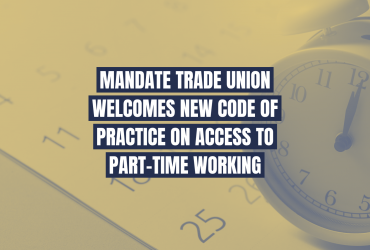RETAIL WORKERS CALL ON TD’S TO END INSECURE WORK
Sunday 5 November 2017Mandate Trade Union members today (Tuesday, 14th November 2017) called on all TD’s to sign the “Secure Hours – Better Future” charter which would end zero hours and ‘If and When’ contracts.
The Union said Dunnes Stores workers, along with tens of thousands of others, do not know from week-to-week what hours and income they will have.
John Douglas, Mandate Trade Union General Secretary said:
“We know that 85 percent of all Dunnes Stores workers say that hours are used as a method of control over them. If they lodge a grievance, make a complaint or even join a Union, there is the potential to have your hours and income slashed from €400 per week to €160 per week. This can create huge problems in terms of paying essential bills or obtaining loans or mortgages.”
Mr Douglas said retail workers are concerned that the forthcoming government Bill will contain loopholes to allow employers avoid giving their workers security over their hours.
“Sinn Fein have a Bill, the Labour Party have a Bill and now the government is drafting its own Bill,” said Mr Douglas. “We need action on this now, but we need to make sure that the government Bill does what it’s supposed to do, give workers security over their incomes.”
The Banded Hours Contracts Bill, moved by Sinn Fein TD David Cullinane, has already progressed through the Dail and the Joint Oireachtas Committee on Jobs, Enterprise and Innovation. The Joint Oireachtas Committee made 23 recommendations but the Ceann Comhairle’s office attached a “money message” to the Bill, meaning it cannot progress any further without the agreement of the government.
“We’re very concerned that the government will water down the good work that has already taken place in the Oireachtas. The Joint Oireachtas Committee has already heard from all relevant parties; employers’ groups; trade unions; legal experts; academics and more. What’s needed now is action,” said Mr Douglas.
He added, “There’s no point bringing in bad legislation which will not achieve the minimum standards set out in our Secure Hours – Better Future charter. Anything less than this will not serve the needs of low paid and low hour contract workers so we are asking all TD’s from all political parties to sign this charter and ensure our most vulnerable workers are protected.”
Dr Caroline Murphy, Lecturer in Employment Relations & Dr Juliet McMahon, Lecturer in Human Resource Management and Industrial Relations, who were co-authors of the University of Limerick Report: “A Study on the Prevalence of Zero Hours Contracts among Irish Employers and their Impact on Employees,” addressed the launch of the Secure Hours – Better Future charter stating:
“The University of Limerick Report on Zero hours Work in Ireland conducted in 2015 established that “if and when” forms of working arrangements have significant negative implications for individuals including: apprehension related to the unpredictability of working hours (in terms of number of hours and scheduling), unstable income, difficulties in accessing finance and welfare benefits, and difficulties in managing work and family life. The report found instances where employment contracts do not accurately reflect the reality of the number of hours regularly worked by individuals.
“The report noted concerns that workers on such arrangements report having insufficient notice of working hours and being sent home from work if not required, and a belief that they may be penalised by their employer for not accepting work when offered.
“The report emphasised the lack of clarity regarding the employment status of individuals working under this type of arrangement.
“Legislative/regulatory reforms are required in order to bring clarity to this matter and furthermore to address the negative implications for workers. Approaching 2018, a number of Bills have emerged but concrete changes have yet to be established.”
Secure Hours = Better Future Charter
- Ban Zero Hour Practices – including exploitative “If and When” contracts.
- Provide workers with secure hour contracts that reflect the reality of the average weekly hours worked.
- Ensure a maximum ‘look-back’ period of 12 months or less to calculate the average weekly hours and the subsequent ‘band of hours’* into which a worker is placed.
- Ensure the maximum width of all ‘band of hours’ is no greater than 5 hours per week
- Protect workers from victimisation for enforcing their rights under this legislation.
- Ensure legislation is implemented so that current workers can avail of its provisions for hours already completed.
*A band of hours provides a level of flexibility for employers but crucially a level of certainty over income for a worker. For instance, they will work between 20-25 hours or 30-35 hours, with no ceiling but a floor of hours which the worker cannot drop below.






